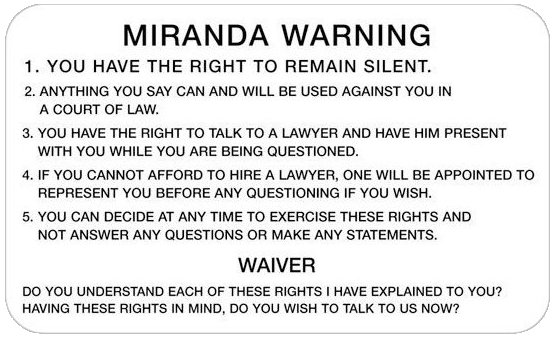What Are Your Miranda Rights?
Often I am told at the beginning of a client interview that the police did not “read them their Miranda rights” so this case is easy to get dismissed. Unfortunately, it’s rarely that simple, despite what you see on TV.
In fact, there is no requirement that police read you Miranda warnings, even if arrested. Say what? However, if police fail to read you Miranda warnings and you are subjected to custodial interrogation then whatever statements you give cannot be used against you in court under most circumstances.
To protect an accused’s right against involuntary self-incrimination (5th Amendment), certain warnings must be given whenever a person is subjected to police interrogation while in custody. Miranda v. Arizona, 384 U.S. 436, 86 S. Ct. 1602 (1966).
- You have the right to remain silent;
- Anything you say can and will be used against you in a court of law;
- You have the right to talk with a lawyer and have him present with you while you are being questioned;
- If you cannot afford a lawyer, one will be appointed to represent you before questioning, if you wish one. If you make a statement or answer questions, you have the right to stop at any time.
When are Miranda Warnings Required?
In order for a suspect to be entitled to the protection afforded by the Fifth Amendment, as set out in Miranda, the suspect must both be in custody and subject to law enforcement interrogation. It doesn’t matter whether an interrogation occurs in a jail, at the scene of a crime, on the street, or the middle of a field; If a person is in custody, the police must read them their Miranda rights if they want to ask questions and use the answers as evidence in trial.
- Defendant in Custody
A custodial interrogation is questioning initiated by law enforcement after a person has been taken into custody or otherwise deprived of his freedom in a significant way. Miranda v. Arizona.
Custody requires arrest or restraint comparable to formal arrest and is judged according to a reasonable person in the suspect’s shoes. Berkemer v. McCarty, 468 U.S. 420, 104 S. Ct. 3138 (1984)
The restraints on a defendant’s freedom must be measured by an objective standard, not by the subjective views harbored by either the interrogating officers or the person being questioned. State v. Easler, 327 S.C. 121, 489 S.E.2d 617 (1997).
- Interrogation by Law Enforcement
Miranda does not apply if a suspect is simply taken into custody; it applies only if, while in custody, he is subjected to interrogation, and only where there is psychological coercion by police. Pennsylvania v. Muniz, 496 U.S. 582, 110 S. Ct. 2638 (1990).
What is interrogation?: Interrogation may be direct questioning or its functional equivalent and includes the police’s words or actions, other than those normally attendant to arrest and custody, that they should know are reasonably likely to elicit an incriminating response. This is judged largely from the defendant’s perspective. Rhode Island v. Innis, 446 U.S. 291, 100 S. Ct. 1682 (1980).
Pre-Arrest Questioning
Do you have to respond to police questions if you haven’t been arrested? No, and you certainly do not have to answer questions even if arrested.
Post-Arrest Questioning
Never talk to police post arrest until you have consulted an attorney and even then make sure that you are aware of all the potential consequences of talking to police. Although you may only want to discuss certain subjects the police may not share your limited view of what h they want to talk about creating a greater adversarial environment.
Why not talk to police? Police receive continuous training on interrogating suspects and you most likely have had none, therefore the odds are stacked against you before you even begin. Despite what may be said, the police have a job to do and that is trying to make their case and collect evidence, talking to them will most certainly include questions about what you know about a crime or at a minimum who was involved and how you know. Often, a suspect does not even realize that they are providing information or evidence that is not in their best interests until its too late.
Charleston Criminal Defense Lawyer
If you have been charged with a crime and was subjected to police questioning but are not sure about your Miranda rights contact an experienced and trusted criminal defense lawyer Charleston, SC at the Dale Savage Law Firm today for a free case consultation (843) 530-7813.

